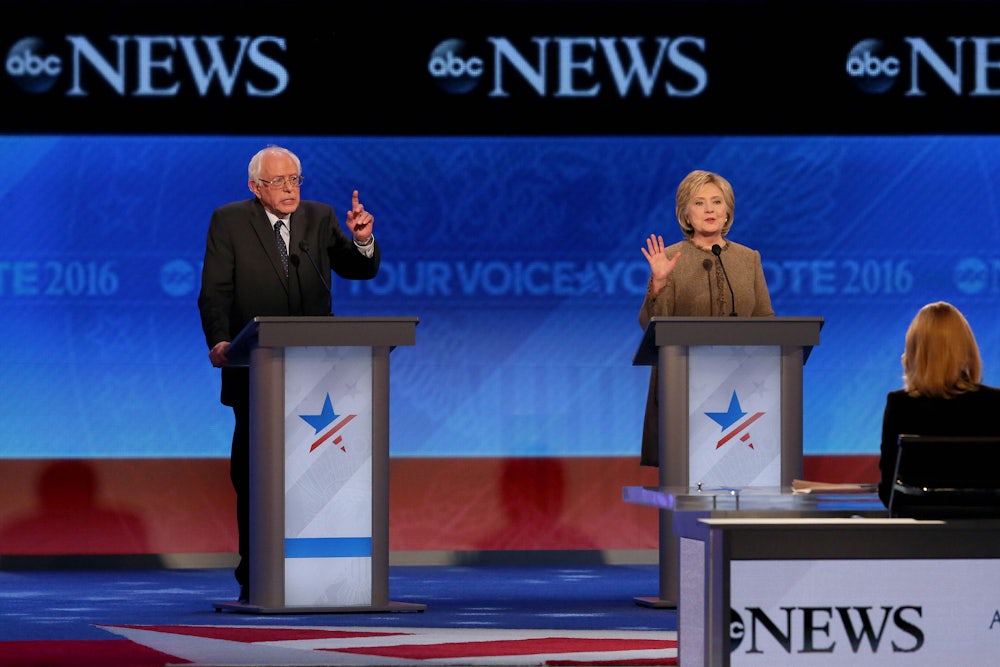The three Democratic presidential candidates met in Manchester, New Hampshire, on December 19 for their third primary debate. Like at the most recent Republican debate, the focus was on national security in the wake of the Paris attacks and San Bernardino shootings. Here are the highlights of the debate, taken from our Minutes blog, where we followed the action as it unfolded.
No sparks flew between Hillary Clinton and Bernie Sanders over the data breach controversy.
After a member of Sanders’s staff viewed voter data from Clinton’s campaign, moderators asked whether Sanders felt his staff was essentially stealing part of Clinton’s playbook.
Sanders was ready for the question, and he answered in several parts. First, he calmly explained how the breach happened and admitted his staff had been wrong. “There was a breach because the DNC vendor screwed up, information came to our campaign. With this information, our staff did the wrong thing. They looked at that information.” Then, he humbly apologized to Clinton and his supporters, and explained how he had been hurt. “It bothers me that rather than working on this issue to resolve it, it has become many press releases from the Clinton campaign.” The frontrunner accepted the apology, eager to move on. “I don’t think people are interested in this,” Clinton said.
The most passionate voice over the question was Martin O’Malley, who quickly tried to jump in, saying the candidates should be talking about security issues.
Bernie Sanders and Martin O’Malley got heated over gun control.
Guns is one of Sanders’s weak spots—he once supported a law that protects gun manufacturers and dealers from lawsuits. It was the perfect opportunity for O’Malley, who Rebecca Leber described as the “third wheel” at the debate, to present himself as a more liberal candidate.
“Senator Sanders voted against the Brady Bill. Senator Sanders voted to give immunity to the gun industry,” O’Malley began.
“Do not explain to me, coming from a state where Democratic governors and Republican governors have supported virtually no gun control,” Sanders began. “Do not tell me that I have not shown courage in standing up to the gun people, in voting to ban assault weapons, voting for instant background checks, voting to end the gun show loophole, and now in a position to create a consensus on gun control.”
Vermont, like New Hampshire, has almost nonexistent gun regulations. Today an estimated 70 to 75 percent of Vermonters own guns. Sanders, when asked whether he would try to prevent people from getting guns in the wake of the Paris and San Bernardino attacks, reaffirmed his support for the Second Amendment. “It’s a country in which people choose to buy guns,” he said. “That’s the right of people.”
Clinton was fashionably late to the second half of the debate.
When ABC returned from an intermission, Hillary was nowhere to be found. Martin O’Malley and Bernie Sanders stood on opposite sides of a mysteriously empty podium.
The New Republic’s Alex Shephard speculated on some of the places Clinton might have been:
- Checking her emails.
- Doing the dances from the “Hotline Bling” video.
- High-fiving her staffers.
- Asking her staffers if its “hillaryclinton.com” or “hillaryclinton.net.”
- Taking off her blazer, revealing an identical blazer.
ABC may get in more trouble than Clinton for her absence: Showing an empty podium is sometimes against the agreements networks make to host debates and was one of the things the RNC tried to ban from GOP debates. It did make for a very GIF-able entrance when Clinton finally showed up:
ABC's shot of Hillary Clinton's empty podium: Fair game or poor form? https://t.co/GsTMxSCHKg https://t.co/0qDDE9eHIL
— Aaron Blake (@AaronBlakeWP) December 20, 2015Sanders said Clinton is “too much into regime change.”
While discussing the challenges posed by ISIS and the Middle East, Sanders did his best to set himself apart from Clinton and remind voters of her support for the Iraq War and the U.S.’s intervention in Libya. “Our differences are fairly deep on this issue,” Sanders said. “I think, and I say this with due respect, that ... Secretary Clinton is too much into regime change.”
“Regime change is easy, getting rid of dictators is easy,” Sanders said. “But you have to think about what happens the day after.”
Hillary said everyone should love Hillary—including Wall Street!
“Should corporate America love Hillary Clinton?” ABC’s David Muir asked. “Everybody should!” she replied.
As the New Republic’s Suzy Khimm pointed out, “Clinton’s attempt to strike a moderate tone on the issue also set up a perfect lay-up for Bernie.”
“Will corporate America love a President Sanders?” Muir asked Sanders, an avowed socialist endorsed by Occupy Wall Street. “No,” he said, “I think they won’t.”
